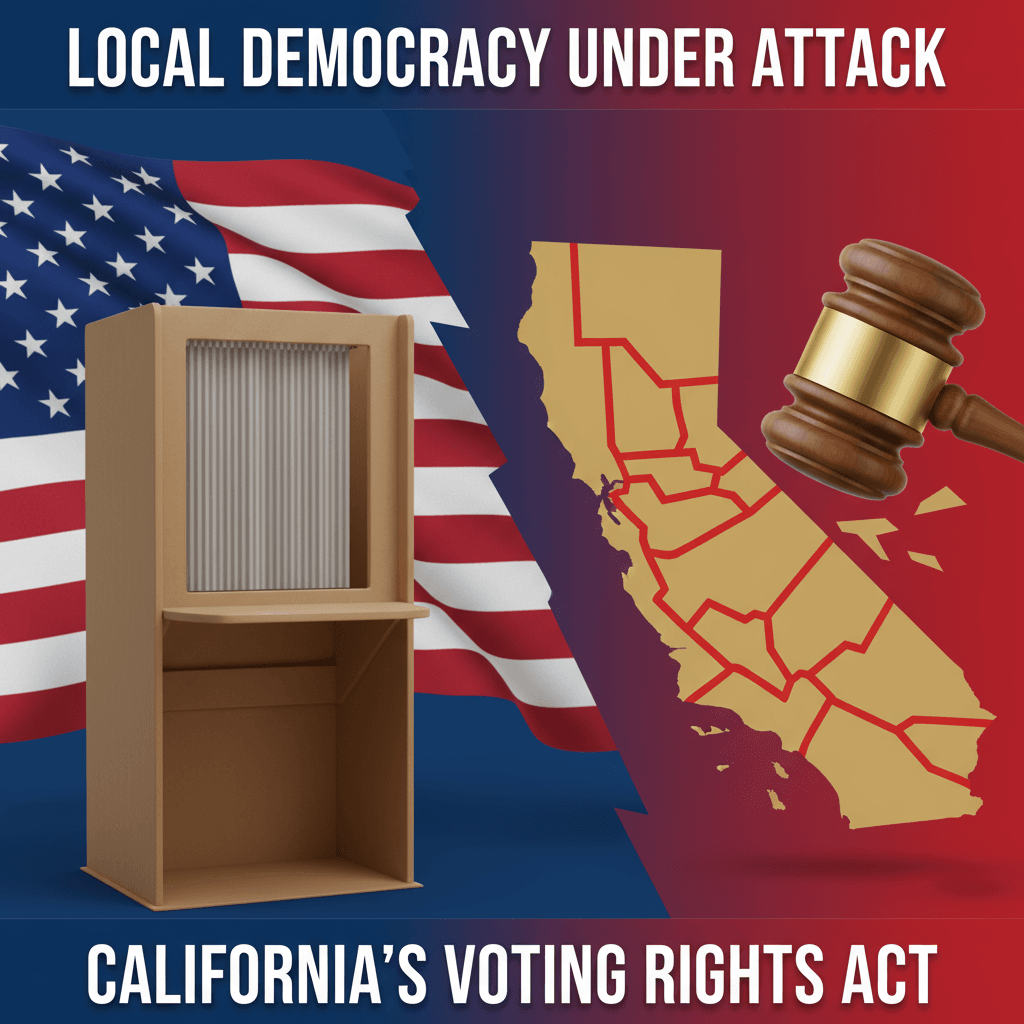How California’s Voting Rights Act Is Destroying Local Democracy in Hayward—And Your City Could Be Next


The quiet city of Hayward, California, just became the latest casualty in a statewide assault on local democracy. Under pressure from California’s so-called “Voting Rights Act,” this Alameda County community has been forced to abandon its traditional at-large election system in favor of district-based voting—a change that will fundamentally alter how residents choose their representatives starting in 2026.
While proponents claim this mandate promotes “equity,” the reality is far more troubling. Hayward’s capitulation represents a dangerous precedent that threatens the very foundation of local self-governance, replacing voter choice with government-imposed racial gerrymandering disguised as civil rights progress.
The California Voting Rights Act: A Wolf in Sheep’s Clothing
Understanding the Legal Framework
California’s Voting Rights Act of 2001 differs significantly from its federal counterpart. While the federal Voting Rights Act requires proof of intentional discrimination, California’s version allows challenges based merely on “racially polarized voting”—a nebulous standard that essentially makes any at-large election system vulnerable to expensive litigation.
The law creates a legal minefield for municipalities. Cities face a stark choice: spend hundreds of thousands of dollars defending their democratic traditions in court, or preemptively surrender to demands for district elections. For cash-strapped local governments already struggling with budget constraints, the decision often comes down to fiscal survival rather than democratic principles.
The Extortion Model
This system operates like legalized extortion. Activist attorneys, often working on contingency fees, target cities with at-large systems and threaten costly lawsuits. The mere threat is usually enough to force compliance, as defending against such claims can cost more than many small cities’ entire annual budgets.
Hayward’s decision to switch to district elections wasn’t made because residents demanded change—it was made because the city couldn’t afford to fight a legal battle it might lose under California’s deliberately broad interpretation of voting rights violations.
Why At-Large Elections Serve Democracy Better
Promoting Unity Over Division
At-large election systems require candidates to appeal to the entire community, not just narrow geographic or demographic constituencies. This creates natural incentives for coalition-building and forces politicians to consider the needs of all residents, not just those in their particular district.
When council members represent the whole city, they’re accountable to everyone. This promotes policies that benefit the community as a whole rather than parochial interests that might conflict with broader municipal needs.
Encouraging Qualified Candidates
Under at-large systems, the best candidates can emerge from anywhere in the community. District systems artificially limit voter choice by restricting candidacy based on where someone happens to live. Why should a highly qualified potential council member be disqualified simply because they live on the “wrong” side of an arbitrary line drawn on a map?
This geographic restriction particularly harms growing communities where the most engaged civic leaders might cluster in certain neighborhoods due to factors like homeownership rates, length of residence, or simple community involvement patterns.
Avoiding Racial Gerrymandering
Perhaps most troubling, district systems often lead to racial and ethnic gerrymandering—the very problem civil rights laws were supposed to prevent. When districts are drawn specifically to ensure certain demographic outcomes, we’ve moved from equality of opportunity to government-mandated equality of results.
This approach treats voters as members of racial groups first and individual citizens second, undermining the fundamental American principle that we judge people by their character and qualifications, not their demographic characteristics.
The Hidden Costs of Forced District Elections
Financial Burden on Taxpayers
Creating district boundaries requires expensive demographic analysis, legal consultation, and often multiple rounds of public hearings and revisions. Hayward taxpayers will bear these costs despite never asking for this change.
Ongoing administration of district elections also increases complexity and expense. Cities must maintain separate voter rolls, potentially hold separate primary elections, and navigate the administrative challenges of ensuring candidates actually live in their designated districts.
Reduced Voter Influence
Paradoxically, district elections often reduce individual voter influence. Instead of choosing from all qualified candidates citywide, voters are limited to only those who happen to live in their district. This geographic lottery system means the quality of representation depends entirely on which candidates happen to reside in each arbitrary district.
For many voters, this represents a significant reduction in democratic choice and civic engagement opportunities.
The Broader Assault on Local Control
State Overreach in Action
Hayward’s forced transition exemplifies a broader pattern of state government overreach that conservatives should find deeply concerning. Sacramento politicians and activist courts are systematically dismantling local democratic traditions that have served communities well for generations.
This represents exactly the kind of top-down mandate that conservative principles oppose—distant bureaucrats imposing one-size-fits-all solutions on diverse local communities without regard for local preferences or circumstances.
Undermining Community Self-Determination
Local governments are supposed to be closest to the people they serve. When state laws force communities to abandon their chosen electoral systems, we’ve fundamentally altered the relationship between citizens and their government.
Hayward residents never voted to change their election system. They never demanded district representation. This change was imposed on them by a state law designed to override local democratic decision-making.
What Conservatives Can Learn from Hayward’s Surrender
The Importance of Proactive Defense
Hayward’s capitulation demonstrates what happens when communities fail to prepare for these legal challenges. Cities need to document the effectiveness of their current systems and build legal war chests to defend against frivolous voting rights challenges.
Conservative legal organizations should prioritize supporting municipalities facing these attacks, recognizing that local democracy is the foundation of all democratic governance.
The Need for Legislative Reform
California’s Voting Rights Act needs fundamental reform to restore balance between legitimate civil rights protections and respect for local democratic traditions. The current system incentivizes litigation over dialogue and imposed solutions over community consensus.
Conservative legislators should champion reforms that require clear evidence of actual discrimination rather than statistical disparities that might have numerous innocent explanations.
Protecting Democracy Requires Vigilance
The transformation of Hayward’s electoral system under California’s Voting Rights Act represents more than a local policy change—it’s a fundamental shift away from democratic self-governance toward government-imposed demographic engineering.
When we allow distant authorities to override local democratic choices based on vague statistical standards, we’ve abandoned the principle that communities should control their own destinies. Hayward’s residents deserved better than having their electoral system redesigned by Sacramento bureaucrats and activist attorneys.
The fight for local democracy doesn’t end in Hayward. Across California and beyond, communities face similar pressures to abandon time-tested democratic traditions in favor of systems designed to achieve predetermined demographic outcomes rather than genuine representation.
Conservative Americans must recognize that defending local democracy isn’t just about election systems—it’s about preserving the fundamental right of communities to govern themselves according to their own values and preferences.
Call to Action
Stay informed about voting rights challenges in your community and support local officials who defend traditional democratic principles. Get involved in local government to ensure your voice is heard before outside forces impose unwanted changes. Share this article to help other conservatives understand how California’s Voting Rights Act threatens local democracy nationwide. The future of community self-governance depends on citizens who refuse to let distant bureaucrats redesign our democratic institutions without our consent.













